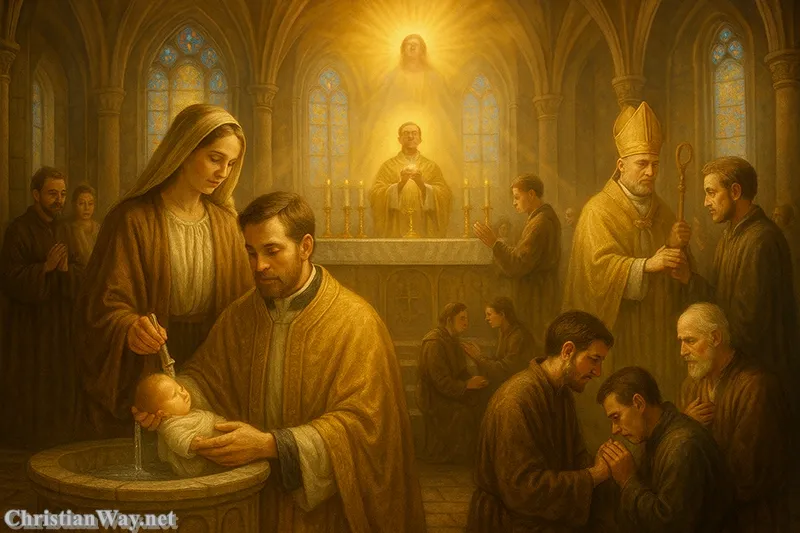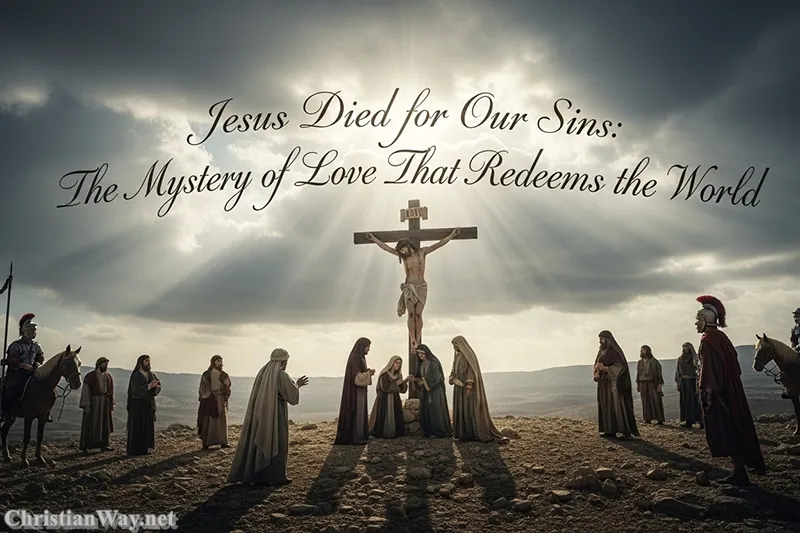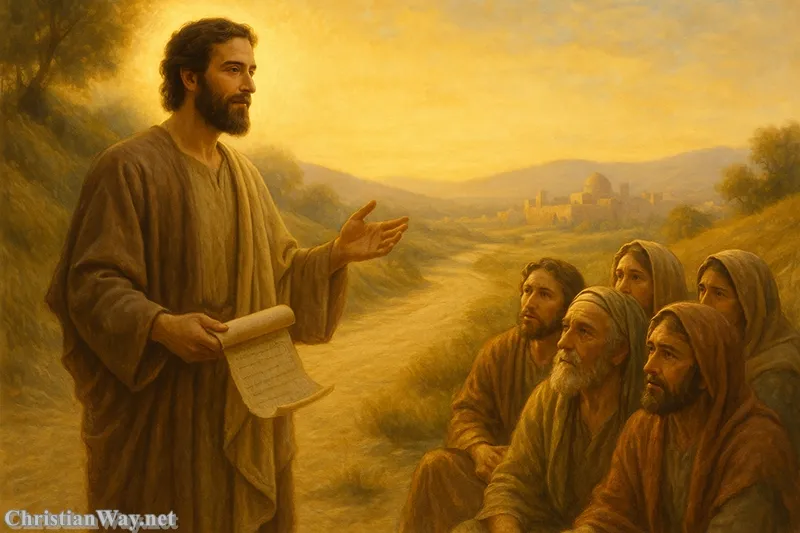Dear friends in Christ,
Every human soul yearns for the touch of the divine. Deep within us lies a hunger not only to believe in God but to encounter Him — to feel His nearness, to be strengthened by His grace, and to know that His mercy flows into the very fabric of our daily lives. In the Christian faith, this divine nearness is not abstract or distant; it comes to us through sacred signs that Christ Himself instituted — the Sacraments.
The Sacraments are the visible expressions of an invisible grace, the holy bridges between heaven and earth. They are moments when God stoops down to meet us in water, bread, wine, oil, and word — transforming the ordinary into vessels of divine life. Each one bears the imprint of Christ’s love, given for the salvation of the world.

In this reflection, let us journey together through the meaning of the Sacraments — not as mere rituals or symbols, but as living realities through which Christ continues to dwell in His Church and in every believer’s heart.
The Mystery of the Sacraments
The Word “Sacrament”
The word Sacrament comes from the Latin sacramentum, meaning “a sacred sign” or “oath.” In the Greek-speaking early Church, the word mysterion (μυστήριον) was used — meaning “mystery.” Both words reveal something profound: the Sacraments are divine mysteries, visible signs that communicate invisible realities. They are not magic; they are encounters with the living God who chooses to sanctify us through created things.
Saint Augustine described a Sacrament as “a visible sign of an invisible grace.” The water of Baptism, the bread and wine of the Eucharist, the oil of Anointing — all these are outward forms through which Christ Himself acts, touching the soul and transforming it by His power.
Christ the Source of All Sacraments
Every Sacrament finds its origin in Christ. He is the true Sacrament — the visible presence of the invisible God. In His Incarnation, the Word became flesh so that God could be seen, heard, and touched. From His pierced side on the Cross flowed blood and water, signs of the new life He would impart to His Church through the Sacraments.
The Catechism of the Catholic Church teaches: “The mysteries of Christ’s life are the foundations of what He would henceforth dispense in the sacraments, through the ministers of His Church” (CCC 1115). Thus, each Sacrament is not an isolated ceremony but a participation in the saving work of Christ.
The Seven Sacraments: A Life of Grace
The Church recognizes seven Sacraments, instituted by Christ and entrusted to the Church as means of sanctification: Baptism, Confirmation, Eucharist, Penance (Reconciliation), Anointing of the Sick, Matrimony, and Holy Orders.
They can be grouped according to their purpose in the Christian life:
- Sacraments of Initiation – Baptism, Confirmation, and Eucharist
- Sacraments of Healing – Penance and Anointing of the Sick
- Sacraments of Service – Matrimony and Holy Orders
Let us contemplate each one as a unique way in which God touches the soul.
The Sacraments of Christian Initiation
Baptism – The Door of Grace
Baptism is the first Sacrament, the foundation of all others. Through it, we are born again of water and the Spirit (John 3:5). Baptism washes away original sin, makes us children of God, and unites us to the Body of Christ, the Church.
The sign is simple — water — yet the grace is immeasurable. As Saint Paul writes, “We were buried therefore with Him by baptism into death, so that, just as Christ was raised from the dead by the glory of the Father, we too might walk in newness of life” (Romans 6:4).
In Baptism, the old self dies; the new self, reborn in Christ, begins to live. Whether we were baptized as infants or adults, the grace of that moment remains the foundation of our spiritual journey.
Confirmation – The Seal of the Holy Spirit
If Baptism gives us new life, Confirmation strengthens it. It is the outpouring of the Holy Spirit — the same Spirit who descended upon the Apostles at Pentecost. The bishop’s laying on of hands and the anointing with chrism signify this deepening of grace.
The Spirit equips us for mission. Just as the Apostles were empowered to witness to Christ, so every confirmed Christian is called to be a living testimony of the Gospel. The grace of Confirmation is not for comfort but for courage — to stand firm in faith, to serve in love, and to live in truth.
The Eucharist – The Source and Summit of Christian Life
The Eucharist is the heart of all Sacraments. In it, Christ gives us not a symbol, but Himself — truly present in His Body and Blood. “Do this in remembrance of Me,” He said at the Last Supper (Luke 22:19).
Each Mass is a participation in the one eternal sacrifice of Christ on the Cross. The bread and wine, offered and consecrated, become the living presence of Jesus. The faithful who receive the Eucharist are united intimately with Him and with one another, for “we, though many, are one body” (1 Corinthians 10:17).
To live the Eucharist is to live in thanksgiving (eucharistia) — allowing Christ’s self-giving love to shape our own.
The Sacraments of Healing
Penance – The Sacrament of Forgiveness and Reconciliation
Even after Baptism, we remain frail and prone to sin. Yet God, in His mercy, has given us a way to be reconciled: the Sacrament of Penance.
When we confess our sins sincerely to a priest, we are not merely speaking to a man — we are speaking to Christ, who forgives through His minister. “Whose sins you forgive, they are forgiven,” Jesus told His Apostles (John 20:23).
This Sacrament restores peace to the conscience, heals the wounds of sin, and reconciles us to the Church. True repentance is not fear of punishment but a longing to return home to the Father, like the prodigal son embraced in mercy.
Anointing of the Sick – Grace in Suffering
Sickness and suffering are part of the human condition, but they need not be without meaning. In the Anointing of the Sick, the Church brings Christ’s healing presence to those who are ill or near death.
Through the anointing with oil and the prayer of faith, the sick person is strengthened, comforted, and united more closely to the suffering Christ. Sometimes physical healing occurs; always spiritual grace is given.
Saint James writes, “Is anyone among you sick? Let him call for the elders of the church, and let them pray over him, anointing him with oil in the name of the Lord” (James 5:14).
This Sacrament reminds us that no suffering is wasted when united with the Cross. In weakness, we encounter the power of divine love.
The Sacraments of Service
Matrimony – The Covenant of Love
Marriage is more than a social contract; it is a divine covenant. When a man and a woman give themselves to each other in Christ, their union becomes a living sign of God’s love for His people.
In the Sacrament of Matrimony, the couple themselves are the ministers. Through their mutual consent and lifelong fidelity, they become one flesh, reflecting the mystery of Christ and His Church (Ephesians 5:32).
Married love, sanctified by grace, becomes a school of holiness. Through the joys and trials of family life, spouses learn the language of self-giving love — the same love by which Christ laid down His life for His Bride, the Church.
Holy Orders – The Service of Shepherds
In Holy Orders, men are consecrated to serve as deacons, priests, or bishops — to preach the Word, celebrate the Sacraments, and shepherd God’s people.
This Sacrament continues Christ’s own ministry as the Good Shepherd. The ordained act in persona Christi, in the person of Christ, so that it is truly He who baptizes, forgives, and feeds His flock through them.
The grace of Holy Orders is not about privilege but service — a call to lay down one’s life for the Church. As Jesus said, “Whoever would be great among you must be your servant” (Matthew 20:26).
The Unity of the Sacraments
Though distinct, the seven Sacraments form a harmonious whole. Each reveals a facet of God’s saving love and draws us into deeper communion with Him. Baptism begins the journey, the Eucharist sustains it, Penance restores it, and the others strengthen and sanctify us for our vocation in the world.
Together they trace the path of the Christian life — from birth in grace to death in hope. They are not mere ceremonies but the living pulse of the Church, beating with Christ’s own heart.
The Orthodox tradition speaks beautifully of the Sacraments as “mysteries,” emphasizing that through them, the believer participates in the divine life. The Protestant tradition, while differing in number and emphasis, also holds the Lord’s Supper and Baptism as essential means of grace — visible words of the Gospel. The Anglican Communion speaks of them as “outward and visible signs of inward and spiritual grace,” preserving both the sacramental and evangelical vision of faith.
Thus, across the Christian family, the Sacraments remain a shared language of grace — a testimony that God’s love is not distant, but incarnate.
Living the Sacramental Life
To live a sacramental life is to live in rhythm with grace. Every time we attend Mass, confess our sins, bless our home, or care for the sick, we are participating in the same divine mystery that began with Christ’s saving work.
The Sacraments are not isolated events but a continual invitation to conversion and holiness. They shape our hearts, strengthen our community, and remind us that God’s grace is never exhausted.
In Baptism we were claimed; in Confirmation we were sent; in the Eucharist we are nourished; in Penance we are restored; in Anointing we are comforted; in Marriage and Holy Orders we are consecrated for love and service.
The life of grace, therefore, is not confined to the church building. It flows into every act of charity, forgiveness, and faithfulness — making our very lives sacramental.
Reflect and Pray
The Sacraments are Christ’s ongoing embrace of His Church — the living touch of His mercy in every age. Through them, heaven leans down to earth, and the human heart is lifted toward eternity.
May we approach each Sacrament not as routine, but as revelation — a moment when God stoops low to meet us in love.
Let us pray:
Lord Jesus Christ, You are the living Sacrament of the Father’s love.
Through the mysteries You have entrusted to Your Church,
pour Your grace into our hearts,
renew our faith, and make us one in Your Spirit.
May every Sacrament we receive deepen our union with You,
and lead us ever closer to the fullness of Your kingdom.
Amen.
— Fr. John Matthew, for Christian Way





